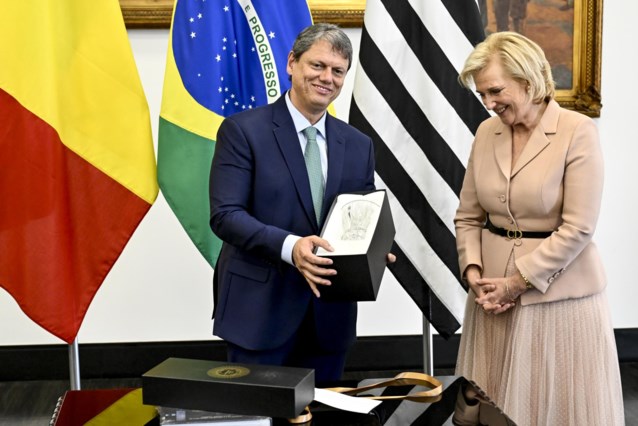The Leuven SME Turbulent signed a letter of intent to develop hydroelectric power stations in Brazil in rivers with a small height difference. “Brazil is the mecca of hydropower (accounts for almost half of electricity production, ed.)but building large dams is almost impossible anymore. And they have no technology for watercourses with low flows,” says Turbulent CEO Walter Buydens. That’s where the technology of the Leuven SME comes in handy. It installs hydroelectric power stations on rivers with a height difference of 1.5 to 5 meters. They work with blades, “horizontal water mills,” says CEO Buydens, that are set in motion by the water and generate electricity.
READ ALSO. Stable energy price as a major asset: Leuven company builds hydroelectric power stations in Taiwan for the world’s largest chip manufacturer
The plans in Brazil are ambitious. To date, Turbulent has built 47 such hydroelectric power stations, including one on the Dender in Papignies, Hainaut. In Brazil alone, 10 to 15 should appear in 2025, said the CEO of Brazilian partner RPI Energy Partners.
Biodiesel and jet fuel
The Zaventem company Desmet signed a contract for the construction of a factory in the state of São Paulo to process soybeans into soy oil. This is a raw material for the production of biodiesel. The soy processing plant, which should be operational in March 2026, is the first step of what will become “the largest biodiesel production site in the world,” according to Desmet’s Brazilian partner, Grupo Potential.
Another energy story came from Ghent. Terra Mater, based in the North Sea Port, wants to use ethanol from Brazil to produce sustainable aviation fuel (sustainable aviation fuel or SAF), said director Kapil Shyam Lokare.
Chocolate, beer and universities
Chocolate news came from The Belgian Chocolate Group, based in Olen, which has a new distributor in Brazil, while brewery De Halve Maan from Bruges signed a contract that will see beers such as Brugse Zot and Straffe Hendrik available for sale in the southern state of Parana.
Furthermore, several universities (UAntwerp, UGent, UHasselt and ULB) concluded cooperation agreements with universities in São Paulo.
Almost a thousand contracts already
“Such signature sessions are important because they show the first concrete impact of the economic missions,” said Fabienne L’Hoost, director general of the Foreign Trade Agency. This has set up the missions – two per year – since 2003. L’Hoost expects that the milestone of a thousand signed contracts will be reached next year. Missions are then planned to India (in March) and to the American state of California (in October).
“And those numbers are just a start,” L’Hoost continued. “We estimate that for every contract signed here, five to ten will be signed in the medium term after the companies return to Belgium.”
Princess Astrid’s speech
“I believe that 2024 represents a crucial opportunity to reach an agreement” on the Mercosur free trade agreement between the European Union and a series of Latin American countries. Princess Astrid said this on Tuesday in São Paulo, in her speech during the official reception of the economic mission she heads in Brazil.
The free trade agreement between the EU and countries such as Brazil, Argentina and Uruguay has been under negotiation for years. There was an agreement in 2019, but it has still not been finalized. There is opposition in several EU countries, mainly out of concern for agricultural sectors. The farmers fear they will be outcompeted by cheaper meat from Latin America, which should not meet the same standards.
“The potential of an expanded market between Europe and Latin America is enormous,” Princess Astrid said. Although she added that there are still “challenges” to be addressed, “especially in sectors such as agriculture, in terms of different production standards and customs tariffs”. To conclude: “But I am confident that through dialogue and mutual understanding we can address those issues.”
Afterwards she referred to the problem of illegal drug trafficking, which is estimated at more than 30 billion euros per year and leads to more crime and violence. “Belgium is working closely with Brazil to tackle these problems,” it said.
At the beginning of her speech, the princess showed a photo of King Albert I, taken in September 1920 on the beach of Copacabana, in Rio de Janeiro, during a state visit. According to her, the photo proves “the deep-rooted friendship between the two countries, which goes beyond mere diplomatic relations.”
After four days in São Paulo, the mission moves to Rio de Janeiro on Wednesday afternoon.
